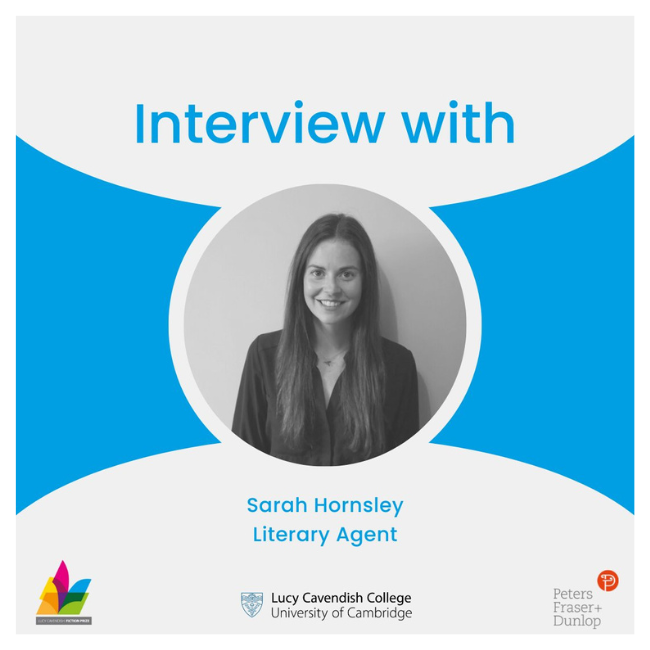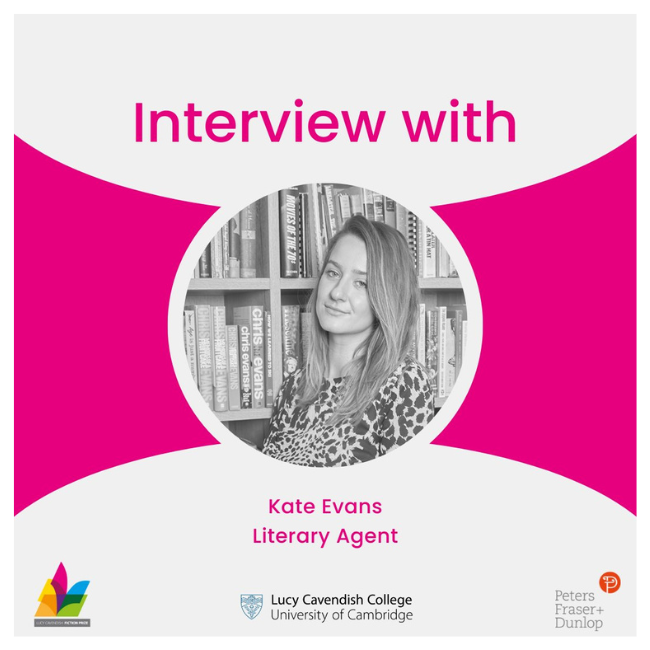-
The 2024 Lucy Cavendish Fiction Prize is open to unpublished women writers, aged 18 or over, who live in the UK or Ireland.
-
We welcome submissions of literary fiction and genre fiction equally.
-
Novels for young adults or children (middle grade or above) are acceptable if they are mainly word-based.
-
Picture books, jointly authored novels and short stories are not eligible for submission.
-
The novel must be unpublished, and must not have been accepted for future publication or be self-published (publishing part of the novel on a blog or website eg one chapter makes a novel ineligible for this competition).
-
Authors must not have agent representation at the time of submission.
-
Only one entry per person is permitted for the 2024 Lucy Cavendish Fiction Prize.
-
Authors cannot have a previous novel published.
-
If you have published specialist/academic non-fiction, you are still eligible to enter your novel to the Fiction Prize as long as the novel you plan to enter remains unpublished online or in print and you do not have agent representation.
-
If you accept agent representation after your submission and before the judging is complete, you will no longer be eligible to take part in the competition and your entry will be discounted. If you accept agent represention, please inform Grace Russell (fictionprize@lucy.cam.ac.uk) regarding this.
-
No current staff member, Fellow or full-time student of Lucy Cavendish College can enter the competition.
-
Shortlisted authors and the winning author will be expected to participate in promotional activities throughout the year.
-
The Lucy Cavendish Fiction Prize will be expected to be mentioned in any published novels that are associated with the Prize.
-
Any entrant found to be in contravention of any of the terms and conditions will be automatically disqualified.
-
The judges’ decision will be final. The judges reserve the right not to award the prize if they think that none of the entries are of sufficient merit.
NB: Due to the volume of entries received it is not possible for the judges to provide feedback on non-longlisted and non-shortlisted entries. Please check the FAQS for more information.
Entries for the 2024 Fiction Prize are now closed.
The longlist will be announced in April.
Thanks to the generosity of friends and supporters we can offer a limited number of sponsored entries for low-income writers otherwise unable to afford entry fees.
How to apply for a sponsored entry
To apply, please select the ‘Sponsored Entry’ option in the Entry type of our online entry form. Applicants must be able to provide proof of financial eligibility such as Jobseeker’s Allowance; Disability Benefit; Income Support; Working Tax Credit; proof of being a full-time student; Housing Benefit; and proof of being a full-time carer. This must be uploaded under the Sponsored Entry - Proof of Financial. Please change the entry fee on the online entry form to £.00 if you are applying for a sponsored entry.
Once your evidence has been submitted and approved, you'll enter a pool from which successful applicants will be selected at random and notified after the 7th of February. Unsuccessful applicants will be offered the choice to apply as a paid entrant.
All details will be kept confidential.
Interested in sponsoring a low-income writer?
If you would like to sponsor a low-income writer, or have any other queries, please email: fictionprize@lucy.cam.ac.uk
Entries for the 2024 Fiction Prize are now closed.
After the submission deadline has passed, all entries are passed on to PFD for reading. A longlist of around 20 entries is then decided by PFD and confirmed by the Fiction Prize longlist judges. The longlist judges then select around 6 of these entries to be shortlisted. The Fiction Prize shortlist judges, alongside the longlist judges, then decide the winner.
Shortlisted authors (plus one guest each), will be invited to the prize-giving drinks reception and awards ceremony. Industry representatives will also be present, as will Fellows and students of the college. This annual occasion has been instrumental in introducing previous winners to their respective agents and allows attendees to mingle with industry specialists.
The Chair of the judging panel, will announce the winner and award the prize of £1,500.00 at a drinks reception at the beginning of the evening. All shortlistees will have the chance to meet industry representatives at the reception.
All shortlisted entrants will receive one-to-one consultation with an agent at our sponsor Peter Fraser + Dunlop (subject to them not having an existing agent) who will give each author editorial feedback as well as valuable publishing advice.
Q. I entered this competition last year but I have reworked my novel, can I submit it for the 2023 Lucy Cavendish Fiction Prize?
A. Yes.
Q. My piece is a short story. Can I enter it?
A. No, this competition is not open to short stories.
Q. Can I submit more than one entry?
A. No. It is one entry per person only.
Q. What format should my synopsis take?
A. There is no fixed format for the synopsis - this is left to the discretion of the writer. The synopsis might be a detailed breakdown of the remainder of the plot or a written sketch that gives the flavour/ overview.
Q. I only have a working title at the moment. Does this matter?
A. No. The title helps with the administration. If you reach the later stages of the competition you will have the opportunity to amend the title if you want to.
Q. I can’t see any information about anonymising my entry. Is it ok to have my name on the entry?
A. There is no need to anonymise your entry. You can, if you wish, include a header or footer with your name and working title, though this is optional. But please remember to include page numbers though!
Q. I can’t get my payment to go through/ I don’t get redirected to PayPal to make my payment- what can I do?
A. It’s worth trying another internet browser eg Chrome or Firefox. Don’t worry if it takes a couple of goes to complete the submission and payment (duplicate entries are deleted from the system). You’ll get an automated “thank-you for your entry” email – any concerns get in touch at fictionprize@lucy.cam.ac.uk. All entry fees need to be received by the deadline for the entry to be considered.
Q. I don’t have a PayPal account. What should I do?
A. No problem, you can pay via PayPal without having a PayPal account, simply follow the instructions.
Q. I don’t have a card to use for online payment. Can I pay the entry fee another way?
A. Yes – it is possible to pay via bank transfer. Please send a short email to fictionprize@lucy.cam.ac.uk and I’ll send you the necessary payment information. Please note that the entry fee must be received BEFORE the deadline, for the entry to be considered, so please allow time for your payment to be received and clear.
Q. I am using a card with a different name to pay my entry fee, how will you link the payment to my entry?
A. The submissions received via the online system are given an ID number and this shows on the payment too (if made via the PayPal page) so there is no problem.
Q. I’ve tried using various internet browsers but I still can’t get the submission form to work. What can I do?
A. Please send an email to fictionprize@lucy.cam.ac.uk and further information will be sent to you ie for an email submission.
Q. I write under a pen name, can I include this in my entry?
A. This information must be added to the entry form (both your legal name and your pen name) and you are welcome to use your pen name on your entry if you wish, this is optional.
Q. I have written a textbook/ children’s picture book/ short story/ poem/ memoir which has been published. Am I eligible to enter the start of my debut novel for this competition?
A. Yes. Provided that you have not had a novel published, for the purposes of this competition, you are considered an unpublished novelist and therefore eligible to enter, if you meet the other criteria.
Q. I am British but I’m currently living overseas, can I enter?
A. No. To be eligible to enter you need to be living in the UK or Ireland (nationality is not relevant).
Q. I have published chapters of my novel on my blog/website self-published. Can I still enter?
A. No, the competition is only for authors that have not published a novel.
Q. I have published an entire book on my website/blog/ self-published via Amazon etc – however this is a different novel. Can I enter this different novel into the competition?
A. No, the competition is only for unpublished authors.
Q. I have submitted my novel to another competition. Can I enter it for the Lucy Cavendish Prize too?
A.Yes. (Even if you have won another competition with the same novel, as long as it remains unpublished online or in print and you do not have agent representation)
Q. I can’t upload PDF files. Can I send Word documents (.doc or .docx) instead?
A. Yes, these will be converted to PDF files before being sent to the judges (PDF files are preferred if possible – sometimes the formatting goes awry in the conversion!).
Q. What font size and spacing do you require?
A. Please use font size 12 and line spacing of 1.5.
Q. Is there a word limit for my submission?
A. No, we do not have a word limit but instead require the first 40-50 pages of your novel alongside a 3-5 page synopsis.
Q. My files are too big or the file title too long for the online submission. What can I do?
A. Please send an email to fictionprize@lucy.cam.ac.uk
Q. I haven’t finished writing my novel. Can I still enter?
A. Yes– you need only have completed the first 40-50 pages and have a synopsis of the remainder (3-5 pages) to enter.
Q. How can I apply for a sponsored entry as a low-income writer?
A. To apply, please select the ‘Sponsored Entry’ option in the Entry type of our online entry form. Applicants must be able to provide proof of financial eligibility such as Jobseeker’s Allowance; Disability Benefit; Income Support; Working Tax Credit; proof of being a full-time student; Housing Benefit; and proof of being a full-time carer. This must be uploaded under the Sponsored Entry - Proof of Financial. We will confirm if you have met the criteria for a sponsored entry. All details will be kept confidential. Please change the entry fee on the online entry form to £.00 if you are applying for a sponsored entry.
Q. Is there a maximum or minimum number of words?
A. No (but remember short stories are not eligible for this competition).
Q. I have a question not covered in this list. What should I do?
A. Please get in touch - email: fictionprize@lucy.cam.ac.uk.
Dr Isobel Maddison

Jackie Ashley
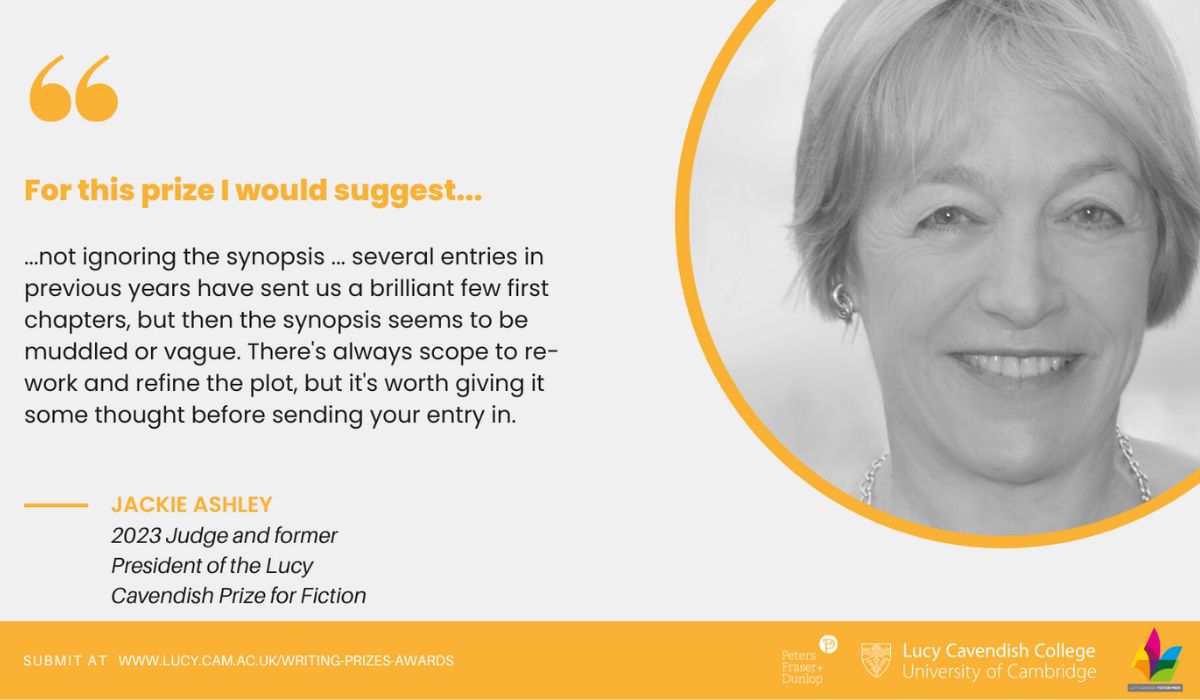
Phoebe Morgan
Gillian Stern
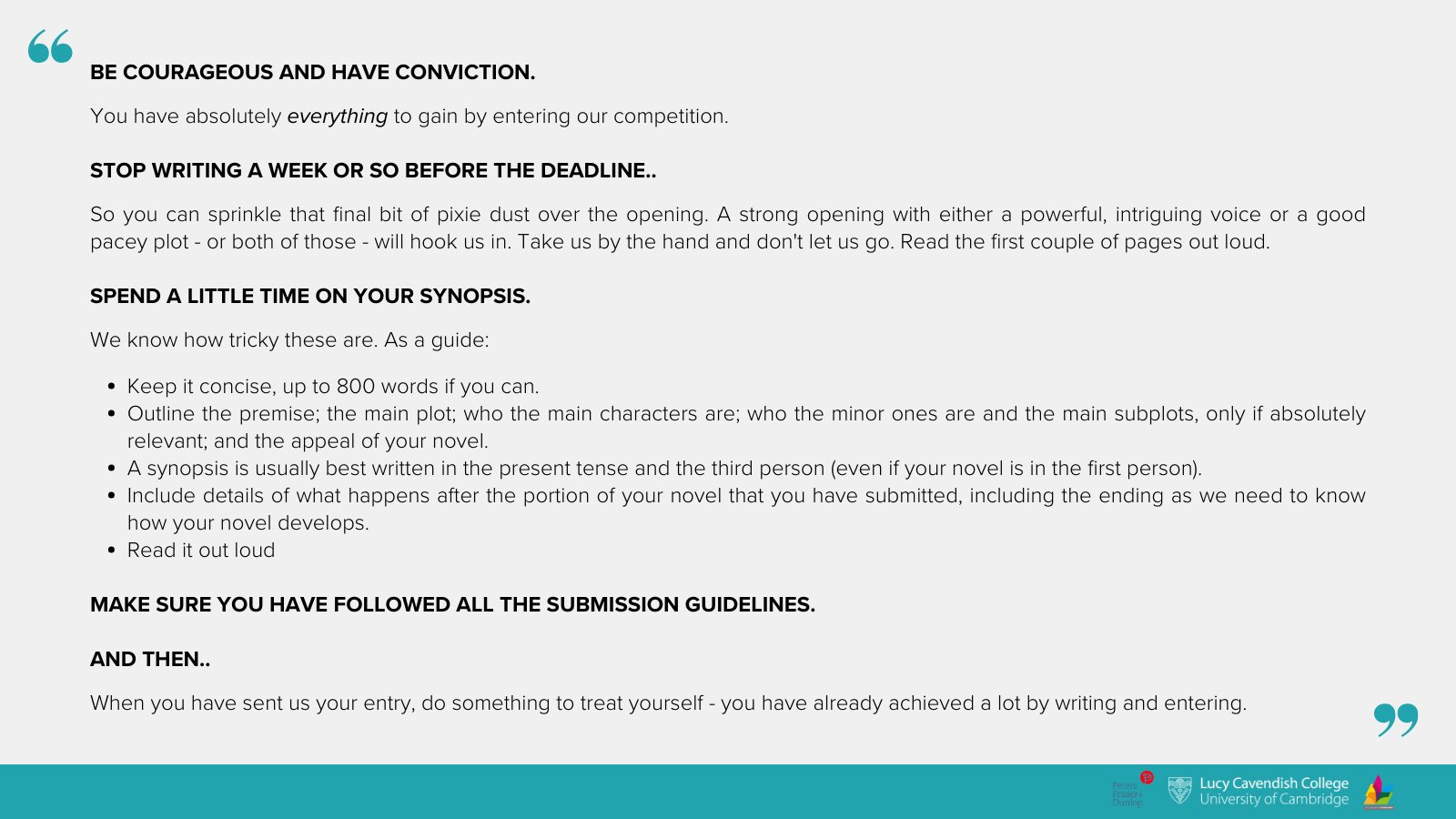
|
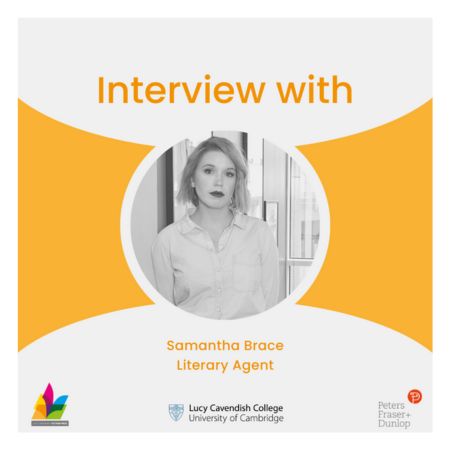
Samantha BraceWhich genre do you work in? I like to say that I work in the crime- or mystery-adjacent genre: any story that has a mystery tugging the reader the whole way through, whether it’s a book club read or a psychological thriller. I mostly work in the commercial to upmarket space dabbling in thrillers, reading group fiction, suspense, and a touch of horror. What makes a standout submission, in your opinion? Incredible writing and a pacey plot: I want to feel torn between lingering over beautiful sentences and racing through them to figure out what happens. What is it that makes a book a page-turner? Whether it’s literary or commercial, character and voice are what will make me turn those pages no matter the genre. It could be the most interesting plot, but if I don’t care about the characters, if I don’t know who they are or what they want, I’ll struggle to keep reading. Characterization is what keeps me invested. |
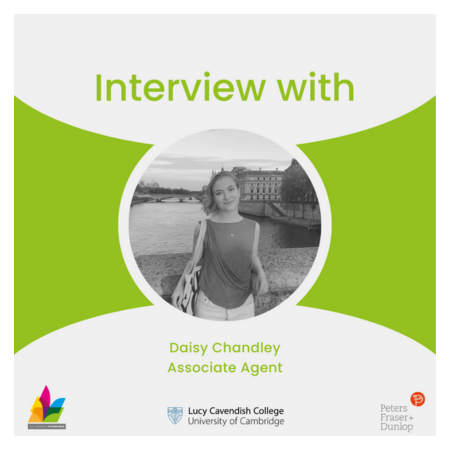
Daisy ChandleyWhich genre do you work in? In fiction, I'm looking for 1) novels on the super literary to book club spectrum with a balance of humour, edge, and heart, 2) things with a darker side, from amateur sleuths and psychological thrillers to smart, fresh horror, and 3) original, com-heavy rom-coms, whether upmarket or more commercial. What makes a standout submission, in your opinion? A clear, concise, and professional pitch letter makes a huge difference right out the gate, but a well-crafted synopsis is a particular green flag - it, like a great pitch letter, show that you really understand and are in total control of the book, how it unfolds and why, and where it sits in the market. All easier said than done, I know... What is it that makes a book a page-turner? I think two of the main things that can make something a page turner are needing to know what happens next (whether that's whodunnit, will-they-or-won't-they, or just figuring out what on earth's going on), or brilliant prose on a sentence level that makes you want to underline every paragraph. If something has both, you're definitely onto a winner! |
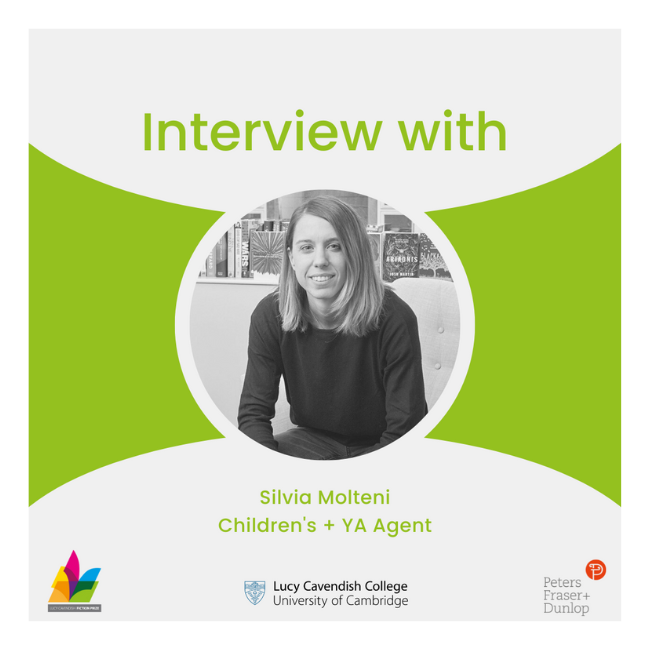
Silvia MolteniWhich genre do you work in? I work with children’s and YA novels across all genres, with a preference for contemporary and realistic settings, humour, magical realism, dark and gothic tales – in the literary and upmarket space, voice and character-driven rather than plot driven. I’m less keen on fantasy, sci-fi and highly commercial fiction. What makes a standout submission, in your opinion? A clear, original and immediate hook, a strong opening and good pace; as well as good comps and a reasonable overall wordcount. I generally veer towards voice and character driven narratives as well as literary fiction and gorgeous writing, so I need to see all of this in a submission from the start. What is it that makes a book ‘unputdownable’? Voice, voice, voice (!) that goes hand in hand with a well-crafted and unputdownable plot of course. |
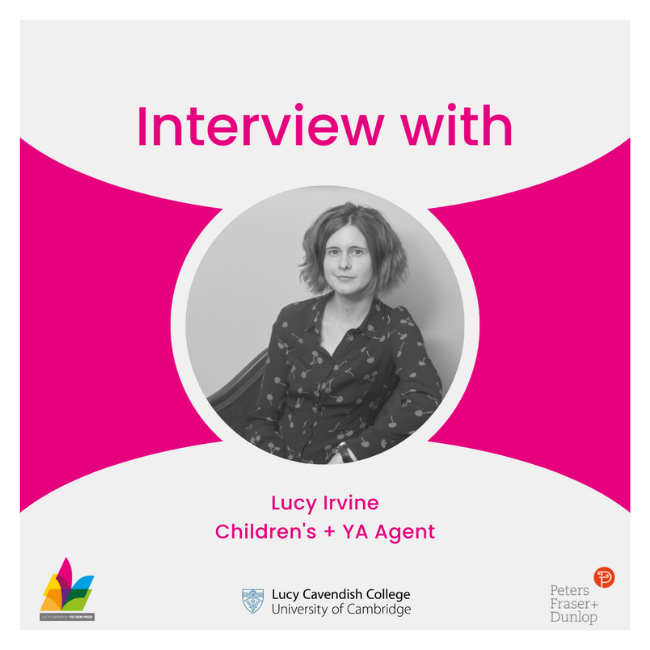
Lucy IrvineWhich genre do you work in? I’m a children’s agent, so I work across all genres from picture books to young adult fiction. I also crossover into adult fiction in science-fiction and fantasy genres. My taste leans towards commercial genre fiction across all of these age categories; I love fantasies, romances, mysteries, historical fiction, science-fiction, etc – anything driven by a compelling and unpredictable plot, or anything with world-building that sucks you in and leaves you wanting more. What makes a standout submission, in your opinion? It’s hard to give a precise answer to this, as often the submission that stands out isn’t necessarily the one which fits most closely with what we’re looking for – I’m saying this in the hope it is reassuring rather than daunting, as it’s always a reminder that this is such a subjective industry and that you should always prioritise writing for your passions rather than writing to a brief or trying to fit within the current trend. In saying that, it absolutely helps if you have a clear and original one-line hook for your story as this will immediately catch the eye. I also think, particularly in children’s fiction, that it’s really important to establish a good sense of character within the sample – we need to be invested in the protagonist and their surroundings/motivations. If you are using comparison titles, then I would try to prioritise recent examples over books like Harry Potter or The Hunger Games, as this shows that you are aware of the market you’re writing within and have a clear sense of where your book will sit on the shelves. What is it that makes a book a page-turner? A hooky concept which is then followed through with strong character and plotting work. I know I’m on to a winner when I start reading a submission and then just can’t stop because I need to find out how it ends! |
|
|
Entries for the 2024 Fiction Prize are now closed.




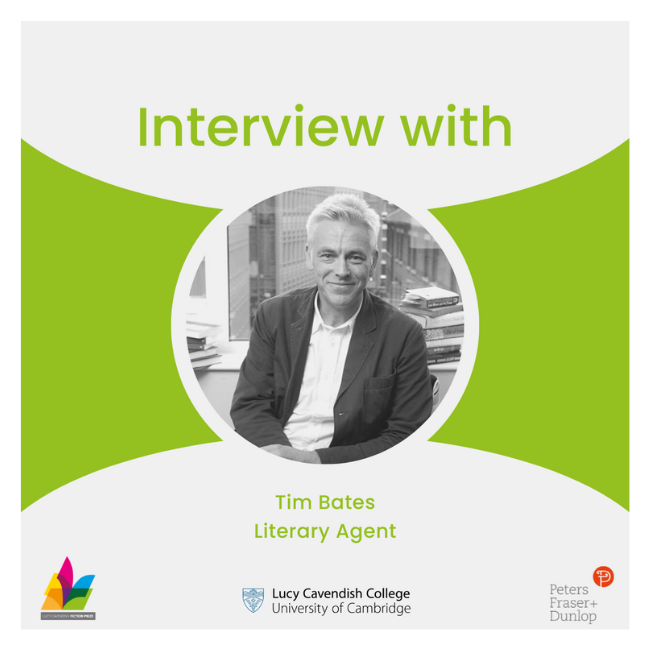 Tim Bates
Tim Bates